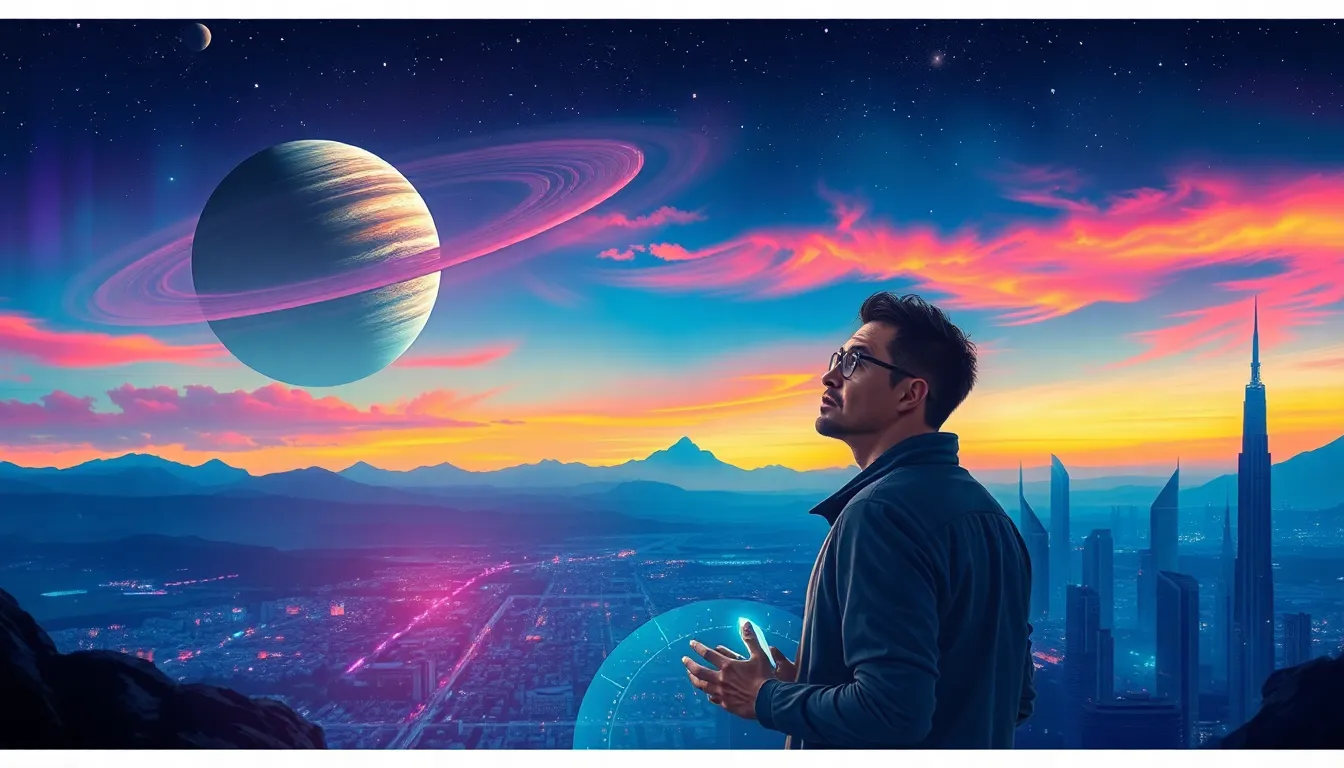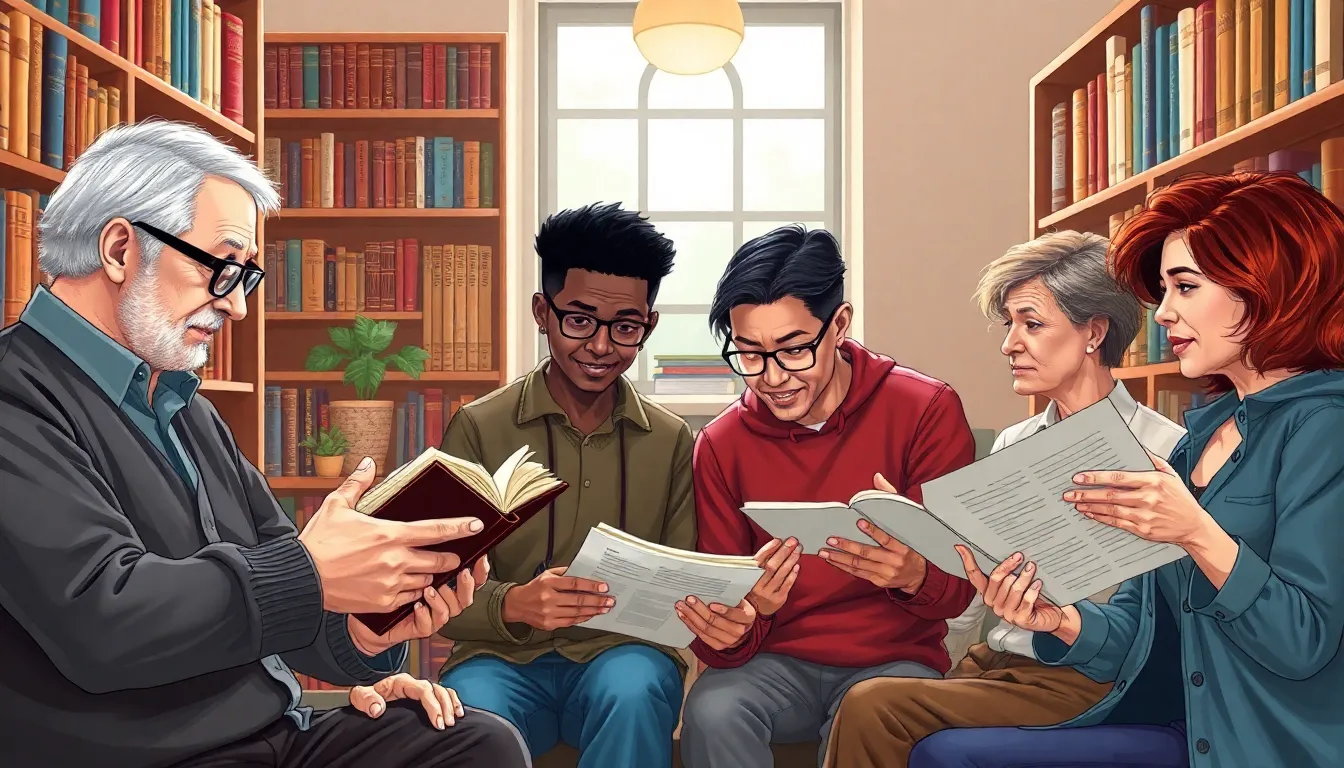
Best Science Fiction Novels: Uncover Timeless Tales and Groundbreaking Voices
In a universe filled with endless possibilities, science fiction novels transport readers to worlds where imagination knows no bounds. From intergalactic battles to mind-bending time travel, these stories ignite curiosity and challenge perceptions of reality. Who wouldn’t want to explore distant planets or converse with intelligent robots while sipping their morning coffee?
Best Science Fiction Novels
Science fiction novels captivate readers with their imaginative exploration of the universe. They offer thrilling narratives filled with futuristic technology and profound philosophical questions.
Classic Science Fiction Novels
Many classic science fiction novels have significantly influenced the genre. “Dune” by Frank Herbert presents a richly detailed universe with complex politics and ecology. “The War of the Worlds” by H.G. Wells explores humanity’s vulnerability against alien invasions. Isaac Asimov’s “Foundation” series delves into the rise and fall of civilizations through psychohistory. “Fahrenheit 451,” authored by Ray Bradbury, addresses the consequences of censorship and the value of literature. Each novel invites readers to consider societal issues through a sci-fi lens.
Modern Science Fiction Novels
Various modern science fiction novels continue to shape the genre and challenge perceptions. “The Three-Body Problem” by Liu Cixin introduces readers to an intricate tale of first contact and cosmic civilizations. In “The Expanse” series, James S.A. Corey blends politics and survival in a gritty space opera setting. N.K. Jemisin’s “The Fifth Season” integrates elements of fantasy and science fiction while addressing themes of oppression. “Neuromancer” by William Gibson established the cyberpunk genre with its exploration of technology’s impact on society. These works emphasize innovation and push the boundaries of traditional storytelling.
Must-Read Authors

Science fiction has a rich tapestry of authors who have shaped the genre. These writers create complex worlds and thought-provoking themes that leave lasting impressions.
Iconic Authors in Science Fiction
Isaac Asimov crafted foundational works like the “Foundation” series, exploring the rise and fall of civilizations. Arthur C. Clarke’s “2001: A Space Odyssey” pushed boundaries of technology and humanity’s place in the universe. Frank Herbert’s “Dune” presents intricate politics and ecology on a desert planet that challenges societal structures. Philip K. Dick’s thought-provoking narratives in “Do Androids Dream of Electric Sheep?” question reality and identity, influencing modern adaptations.
Emerging Voices in the Genre
Nnedi Okorafor brings African futurism to life in novels like “Binti,” blending culture with science fiction. Liu Cixin’s “The Three-Body Problem” introduces readers to complex cosmological themes while addressing existential risks. S.B. Divya’s “Runtime” explores artificial intelligence and ethical dilemmas in a near-future society. Additionally, Becky Chambers’ “Wayfarers” series focuses on character-driven narratives within diverse cultures, highlighting personal growth and connection.
Themes in Science Fiction
Science fiction effectively unravels complex themes, stimulating imagination and encouraging reflection on humanity’s future.
Exploration of Space and Time
Space and time serve as central themes in science fiction narratives. These stories invite readers to ponder vast galaxies and alternate realities. Authors such as Arthur C. Clarke and Isaac Asimov portray interstellar travels, emphasizing humanity’s quest for knowledge. Works like “The Three-Body Problem” explore time manipulation, challenging linear perceptions of existence. Characters embark on cosmic journeys, encountering aliens and advanced technologies. Every story offers new perspectives on the universe’s mysteries, pushing the boundaries of what is possible.
Dystopian and Utopian Futures
Dystopian and utopian visions arise prominently in science fiction. These contrasting futures reflect societal concerns, depicting both hope and despair. Classic novels like “Fahrenheit 451” and modern works such as “The Fifth Season” scrutinize the consequences of technology and governance. Characters navigate oppressive regimes and imagined ideal societies. Each narrative invites readers to question current realities, emphasizing the need for vigilance against potential threats. As authors craft these worlds, they provoke essential discussions on ethics, freedom, and the human condition.
Recommendations by Subgenre
Exploring various subgenres enhances the appreciation of science fiction novels. Each category offers unique narratives and themes.
Hard Science Fiction
Hard science fiction focuses on scientific accuracy and technical detail. Authors like Arthur C. Clarke and Kim Stanley Robinson craft narratives grounded in real science. Notable works include Clarke’s “Rendezvous with Rama,” which explores the arrival of a mysterious spacecraft. Similarly, Robinson’s “Mars Trilogy” examines the complexities of colonizing Mars, delving into socio-political issues and environmental concerns. Readers appreciate the rigor and attention to detail that this subgenre provides.
Space Opera
Space opera combines grand adventures with expansive world-building. It captivates readers through epic battles and political intrigue across galaxies. “Dune” by Frank Herbert stands out for its intricate plot and richly developed universe. Another noteworthy title, “The Expanse” series by James S.A. Corey, portrays a gripping narrative involving interplanetary conflict and human survival. Fans of this subgenre enjoy the dramatic stakes and the exploration of humanity’s future in vast, uncharted spaces.
Cyberpunk
Cyberpunk merges advanced technology with dystopian settings. This subgenre highlights the impact of cybernetics and artificial intelligence on society. Notable works like William Gibson’s “Neuromancer” define the genre with gritty realism and themes of identity. Similarly, “Snow Crash” by Neal Stephenson examines a hyper-commercialized future interwoven with ancient mythology. Enthusiasts are drawn to the cultural critique and exploration of human relationships with technology.
Conclusion
Science fiction continues to captivate readers by pushing the limits of imagination and exploring profound themes that resonate with humanity. Whether through classic masterpieces or innovative modern narratives, this genre invites individuals to envision new realities and question the world around them.
As emerging voices enrich the landscape with fresh perspectives, the future of science fiction looks promising. Each novel serves not only as entertainment but also as a mirror reflecting societal concerns and aspirations. By delving into these extraordinary stories, readers can embark on journeys that inspire thought and ignite curiosity about the universe and our place within it.
